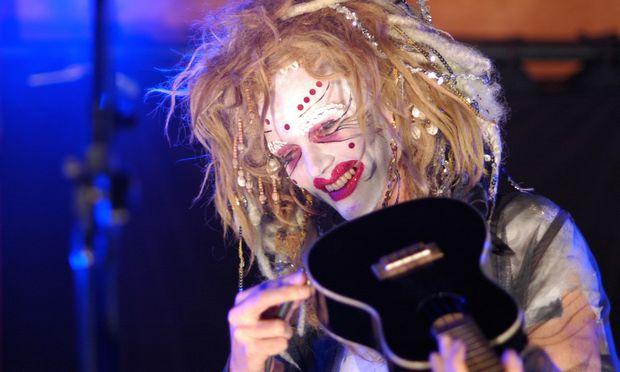Taylor Mac’s new 24-hour epic show is a full history of American pop music — of a kind
Taylor Mac
Theater artist Taylor Mac has a crazily ambitious new project: A 24-hour-long “durational concert” that examines American popular music from the 1770s right up to the present.
It's called, appropriately enough, "A 24-Decade History of Popular Music. But Mac says this version of history takes many liberties: “I say it's my subjective history. I'm not a historian and I don't have an interest in being a historian. … I do a lot of research, and I like to reframe everything.”
Mac views most, if not all, of the music through the lens of gender and sexual identity, even during the many decades of American life when being “gay” meant something very different than it does now.
That queering is a theme across Mac's work. A prolific writer and actor, Mac has performed original works across the globe from Australia to Stockholm to New York. The core of his work is drag performance. Mac uses the name judy (lowercase), "not as a name but as a gender pronoun."
The focus on drag performance stems from an abiding interest in “homogeneity and heterogeneity," Mac says. “I grew up in a suburban town where everyone was supposed to be the same, and I've become fascinated with that as a result. [Performing in] drag is about trying to take a topic and tear that topic apart in a kind of postmodern way, look at all the pieces, and then put them all back together again.”
The Lily's Revenge, Mac's five-hour piece inspired by the anti-gay marriage movement, Noh Theater and plastic flowers, won Mac an Obie Award in 2010. The Village Voice named Mac Best Actor in New York in 2013.
For this latest 24-hour epic, Mac picked a them for each decade of song in the production. The 1770s, for example, are about how America was “founded on booze, man-boy love, and dandy revenge — and we basically go through the songs and we appropriate that,” Mac says.
"Dandy revenge?" Yes — the song "Yankee Doodle" was originally sung by the British to make fun of Americans, mocking them as dandies, Mac explains — and not just dandies, but “false dandies, tacky dandies.”
“The British lost a particular battle and so the Americans forced them to dance to 'Yankee Doodle' while they sang it over and over again — and that's how it became an American song that we sing,” Mac explains. “So there's a little bit of truth to my appropriation, which is that our country was founded on dandy revenge.”
Some periods of time were easier than others. The era of the 1840s and 1850s became trickier to navigate because minstrelsy was such a big thing in those years. Minstrel shows usually mocked black people and culture, using stereotypes played out by white artists in blackface.
“That always comes up,” Mac says. “There are so many minstrel songs, and it's always a balance of not ignoring it, but also not allowing that particular story to become the story of what I'm doing.”
For one of the more recent decades, Mac uses a Ted Nugent song called "Snakeskin Cowboy." “I felt like we needed to do something by somebody who was a conservative,” Mac says, “but we didn't want to actually have to listen to the song, so we just read the lyrics and made up our own melody.”
From the lyrics, it's fair to assume that Nugent intended the song to mean that “it’s OK to bash anyone who's dressed in fancy clothes and performing on a stage," Mac says.
“When I read the lyric, I thought, ‘Ooh, that song needs to be appropriated,’" Mac says. “So we've turned it into a junior high prom dance. … Our point here is that we want to turn Ted Nugent into a gay. That's what we're doing — we're gay-ifying his song. We're emasculating Ted Nugent.”
But even in a costume mocking Ted Nugent, Mac feels at home.
“People will often say, ‘Do you feel like you're hiding when you put on those costumes?” Mac says. “And I say, ‘No, what I'm doing is I'm exposing what I look like on the inside.' When I'm wearing my jeans and a T-shirt, that's when I'm hiding, because I'm trying to blend in with everybody else.”
